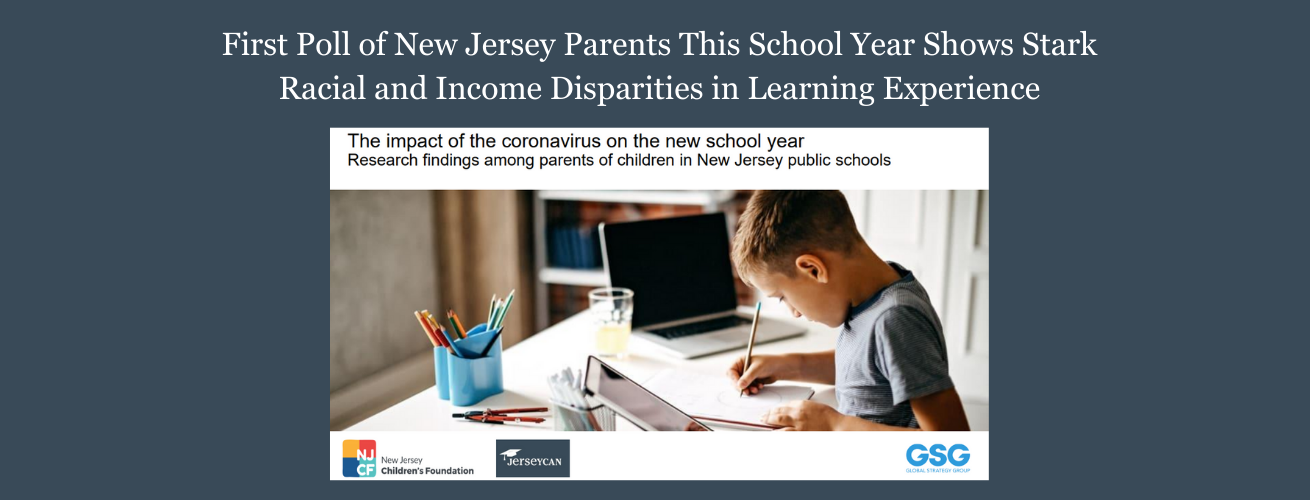First poll of New Jersey parents this school year shows stark racial and income disparities in learning experience. Civil Rights and Parent Leaders Support Poll Findings that Families Need More Support in Remote Learning, Digital Divide, and Food Insecurity
Amidst a statewide spike in COVID-19 cases and an increasing pivot back to more remote learning, the first statewide poll of New Jersey parents this school year shows that families want a better remote education experience. The poll also identified stark racial and income disparities in access to the additional learning help students need to be successful. The statewide survey was conducted by Global Strategy Group and commissioned by the New Jersey Children’s Foundation and the statewide advocacy group JerseyCAN to provide better information to the public and policymakers about the effect of COVID-19 on the state’s 1.3M+ public school students and their families.
New Jersey parents voiced mixed views on remote learning, with only 42% of parents rating the experience as very successful. The statewide survey also found wide gaps in the educational opportunities afforded to low-income, Black and Latinx students during the pandemic, as well as tremendous disparity in economic security faced by these families as a result of the massive shift to remote learning.
“Parents are clearly asking for more from their schools. Public education is neither free nor constitutionally adequate if New Jersey parents don’t have equitable access to the technology, internet service, food, and extra support programs necessary for their students to be successful,” said Kyle Rosenkrans, executive director of the New Jersey Children’s Foundation, a Newark-based non-profit that commissioned the poll.
“Based on this poll, parents’ top concern is ensuring that their children do not fall behind academically, and parents want more access to their children’s teachers, as well information about whether their children are on grade level. We need a bold state policy agenda to address these concerns and get students back on track academically and provide the right social and emotional supports as well,” said Janellen Duffy, senior advisor at JerseyCAN, a statewide education policy and advocacy organization.
“The need for remote learning for students during the coronavirus pandemic is certainly understood, but clearly the disruptions have had a greater effect on low-income families, because of disparities in access to computers, speed and reliability of home internet connections, and less direct instruction from teachers,” stated Vivian Cox Fraser, President & CEO, Urban League of Essex County. “Since the pandemic started in March achievement gaps have been growing. While school districts such as Newark have ensured that children have computers, many students are not consistently engaging with remote assignments. The only way to achieve a comprehensive solution is that we must come together to adopt a holistic approach and provide more supplemental learning and start bringing far more resources into the home.”
“These survey results confirm what has been long known, but too often not addressed in providing remedies and resources for students of color in New Jersey,” said President Richard Smith, New Jersey’s State Conference of the NAACP. “Just as we saw in the spring, we continue to see many Black and Brown students experiencing significant learning loss. There is no doubt our academic response to COVID has exacerbated too many students’ academic achievement gap in our communities. Our state must seek and obtain the needed resources and remedies to address the unequal education and educational opportunities that are hindering the current and future development of communities of color.”
“Families – particularly low-income families and families in urban communities – need greater support from all levels of government to weather the storm of this pandemic, said Shennell McCloud, Executive Director of the Newark-based Project Ready. “It’s critical that we work to close the digital divide in the coming weeks so that remote learning reaches everyone equitably.”
Among the key findings of the poll:
-
- Parents of color and low-income parents are more likely to say that their child is fully remote learning. Statewide, 52% of parents say they have at least one child that is participating in remote learning only, while 45% are participating in hybrid in-person and remote learning, and 11% are fully in person. However, 70% percent of Black parents, 61% of Latinx parents, and 72% of low-income families say that their child is remote learning only. Low-income parents (56%) and parents of color are also less likely to report having the option of hybrid learning (49% Black offered hybrid option, 55% Latinx), when compared to their white (76%) or more affluent peers (73%).
- Financial and work insecurity are top concerns for low-income parents and parents of color. More than four in ten parents (43%) – including 52% of parents of remote learners and 66% of low-income parents – say they are uneasy about their family’s financial situation over the next few months. This includes 56% of parents who say they or their partner had reduced or missed work as the result of the coronavirus. Low-income people of color are hit the hardest, not only are they more likely to change their work schedule so they can be home when their child is not in school (25% low-income Black and Latinx) than parents overall (18%) but are also more likely to say that they or their spouse will take time off or leave their job to stay at home (22% low-income Black and Latinx, 14% overall).
- Low-income parents and low-income parents of color are disproportionately likely to want additional support that they aren’t currently receiving. Forty-seven percent of New Jersey families say that their child will need additional support to have a successful school year (8-10 on a 1 to 10 scale). The need is most concentrated among low-income parents of color: 54% percent of low-income Black parents and 56% of low-income Latinx parents are more likely than high-income parents (45%) and low-income parents overall (51%) to want additional support for their child. Low income parents and parents of remote learners are also less likely to be supplementing their child’s education with educational sources outside public school options. Lack of being able to do these options due to economic reasons is most true among low income families (24%, compared to 7% high income) and parents of remote learners (14% compared to 9% in-person/hybrid).
JerseyCAN’s five-part policy agenda to address these concerns includes:
-
- Empower Parents with Better Information. The NJ Department of Education should work with districts and parent organizations to provide all parents with diagnostic information and tools to help parents understand if their children are on track.
- Conduct Statewide Learning Loss Analysis. The Department of Education should conduct a comprehensive, statewide estimate of the amount of learning loss facing New Jersey students and use that information to calibrate its recovery strategies accordingly.
- Fund Summer Learning Initiatives. The state should identify resources to support school district summer learning initiatives, while leaving parents with the option for their child to repeat a grade, if necessary.
- Extend and Improve COVID-Era School Meal Programs. Given the real concerns that families are facing about food insecurity, the federal and state government must continue to provide additional support to families to access food, by expanding SNAP benefits, extending the federal child nutrition waivers for the rest of the year, and extending the Pandemic-EBT program.
- Create Universal Internet and Device Access for Low-Income Families. The state should extend and expand its digital divide grants program to ensure that every district, school and family has access to the device and internet service they need.
METHODOLOGY:
Global Strategy Group partnered with JerseyCAN and the New Jersey Children’s Foundation to conduct an online (desktop and mobile) survey among 600 parents of children in New Jersey public schools from October 7th – 16th, 2020. The survey had a confidence interval of +/-4.0%. All interviews were conducted via a web-based panel. Care has been taken to ensure the geographic and demographic divisions of public-school parents are properly represented.


 .
. 